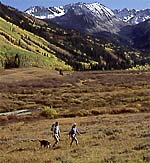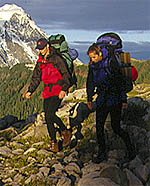Backpacking For
Beginners from REI.com
 To city dwellers,
stepping into a wilderness setting for the first time is an entirely new,
nearly foreign experience. Accordingly, take a few moments to acquaint yourself
with some of the basic ground rules of outdoor exploration and backpacking,
camping and hiking: To city dwellers,
stepping into a wilderness setting for the first time is an entirely new,
nearly foreign experience. Accordingly, take a few moments to acquaint yourself
with some of the basic ground rules of outdoor exploration and backpacking,
camping and hiking:
- Wilderness lands are not
theme parks. Out here, there are no handrails, no water fountains, no flush
toilets, no snack bars, no trash cans, no cheery attendants directing you to
your next attraction. You are on your own, completely dependent on your
individual skills, energy and knowledge. If you're careless, you could get
hurt, or worse. If complete self-reliance is unappealing to you, think twice
before you attempt an overnight trip.
- Nature is utterly
indifferent to your presence. Roaring wind, searing heat, freak snowstorms,
rockslides, idyllic summer afternoons, magnificent sunsets, revelatory moments
of stillness and silencethe good and the bad of nature are both present in the
backcountry, and it can be difficult to predict which face nature will reveal
to you on any given day. The faint presence of danger is what gives backcountry
exploration its distinctive appeal. Always be prepared for the unexpected.
- Backcountry travel
requires a change in thinking and behaving. Wild lands are special, even
sacred places. "The clearest way into the Universe," wrote author John Muir,
"is through a forest wilderness." In this development-minded civilization, our
remaining parcels of wilderness are treasures that should be approached with
joy and a degree of reverence. Tread lightly as you travel. Avoid boomboxes,
litter, commotion and other byproducts of urbanization. Wrote Muir: "Only by
going alone in silence, without baggage, can one truly get into the heart of
the wilderness. All other travel is mere dust and hotels and baggage and
chatter."
- Teach children to respect
the land. Kids might think it's entertaining to paint words on rocks or
gouge initials into trees or cut switchbacks. Adults must be diligent to help
children appreciate the fragile qualities of wilderness lands. Teach them to
leave rocks, flowers and natural features undisturbed.
- Pack out what you pack
in. That's a familiar old bromide that still rings true, right along with
"Take only pictures, leave only footprints," and "Only you can prevent forest
fires." In the wilderness, no one comes along and cleans up after you. You must
take responsibility for all your actions. Leave no lasting impact on the land.
Make sure people coming behind you can enjoy the same sensations of
peacefulness and beauty that you experienced.
|
Other points to keep in
mind:
- Stay on established trails;
when traveling cross-country, choose to walk on rock or snow rather than soil.
- Camp in established campsite
whenever possible.
- Dispose of human waste far
from water sources and trails.
- Use a camp stove rather than
building fires in order to minimize impact.
- Keep your food away from
wildlife, and never feed animals intentionally; it alters their natural
foraging habits.
|
Planning
Your Trip
So, has the time come to plan your
first backpacking trip? Outstanding! Keep a few pointers in mind:
 Pick a
partner. Avoid going solo on your first overnighter in the woods. Team up
with someone who has some backcountry experience, who shares your ambitions (in
terms of distance, elevation gains, etc.) and, importantly, who agrees with
your idea of a comfortable hiking pace. Where can you locate a trail partner? A
good first stop is REI's Trail Partners link in the Camping/Hiking Community
area. Pick a
partner. Avoid going solo on your first overnighter in the woods. Team up
with someone who has some backcountry experience, who shares your ambitions (in
terms of distance, elevation gains, etc.) and, importantly, who agrees with
your idea of a comfortable hiking pace. Where can you locate a trail partner? A
good first stop is REI's Trail Partners link in the Camping/Hiking Community
area.
- Pick a destination. If
possible, choose a backcountry area not too far from home, one that involves an
established trail, regular visitation and established campsites. Maybe limit
your first backcountry excursion to a 1-night stay so you're within a day's
walk of an exit pointjust in case things aren't working out.
- Think ahead. Research
and select a trip suitable for your skills and conditioning. Consult
guidebooks. Confer with the information staff at a ranger station or visitor's
center when you secure your permit (which is usually required). Ask about
up-to-date trail conditions. If, for example, you're hiking in the Sierras, ask
about bear activity. Some Sierra backcountry camping sites have "bear boxes"
for storing food. Is your chosen site equipped with one? Or will you be
required to carry a bear-resistant food container? Educate yourself about
wilderness food storage techniques before you go.
- Prepare. Do some local
day hikes before the Big Event to acquaint yourself with walking in wilderness
terrain. Break in your boots prior to your overnight jaunt. Blisters can
literally stop you in your tracks far from a trailhead. Show courtesy to others
on the trail. Seek out updated weather forecasts. Pick up additional advice
from REI's online clinics and Tips and Tricks in our Community section. You can
print out a page or two of our tips and carry them with you in the field. Store
them with your map for handy reference.
- Gear up. Refer to an
REI checklist to consider what items your particular trip will require. Print
one out. Relax: You won't need everything a checklist mentions, but it will
help you plan so you don't leave behind any items important to you.
Tip: Consider renting or borrowing equipment for your first
trip. REI stores offer rental backpacking equipment. Experience in the field
will help you shop smarter for gear that suits your personal long-term needs.
- Make it fun. That's
the whole point.
|
|